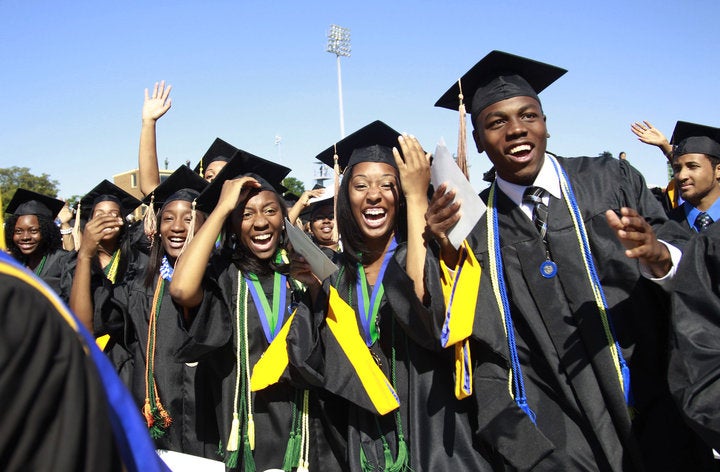
When I arrived at North Carolina A&T State University in 1964, I was enamoured by the diversity of backgrounds and experiences that my classmates hailed from. The campus was full of an energy that affirmed Blackness and made space for each of us. I know my experience is not unique.
In fact, this month 300,000 students will attempt to continue their education at our nation’s 102 Historically Black Colleges and Universities, or HBCUs. Usually, back to school means reconnecting with friends, moving into a new dorm, or standing in line at the Registrar. These are far from typical times – instead, HBCU students will navigate a changed world and learning environment in the midst of a public health crisis.
COVID-19 has presented us with numerous challenges, none more important than its impact on our children and young adults seeking an education. I have always believed in the words of W.E.B. DuBois, “of all the civil rights for which the world has struggled and fought for 500 years, the right to learn is undoubtedly the most fundamental”.
That deep belief in the power of education is why I spent four decades as an art teacher at Bennett College, one of two all women HBCUs. And our HBCUs are about much more than traditional education. As an educator, I expanded the classroom by leading the effort to increase student civic participation. We coined the phrase “Bennett Belles are Voting Belles” by organizing annual marches to the polls. Only at an HBCU, where our tradition is born of civic duty and activism.
Freed from the depths of slavery, the first thing freedmen and women sought was to nourish their intellectual curiosity. Barred from reading and writing as slaves, they knew education was the pathway to a better life. A century and a half later, their descendants know the same is true and they wonder whether COVID-19 will shut that pathway closed.
And that would be a loss that extends far beyond the attendees of HBCUs. As key economic drivers in their communities, with an economic impact of $15 billion, according to the United Negro College Fund. HBCUs employ over 130,000 individuals nationwide and prepare their students for jobs that confer over $130 billion in career earnings, they spur groundbreaking research into medical treatments. Howard University Hospital is a key COVID-19 treatment facility and has taken the lead in examining health disparities among African American patients in Washington. This is all the more remarkable due to their less-than-ideal fiscal portfolios. Tight in a typical year, HBCU budgets are hard hit by the need to refund students for services not rendered. This school year, they will be expected to institute remote learning curriculums, while suffering possible enrollment losses of up to 20 percent due to the economic hit of this pandemic. With some private HBCUs in particular that obtain as much as 90 percent of their operating revenue from tuition and fees, a fiscal shock could become a calamity.
Since the first HBCU, Cheney University, founded in 1837, 18 HBCUs have been forced to close their doors – almost all due to financial troubles. COVID-19 presents the biggest threat to HBCUs since the Great Recession of 2008, which led to the closures of Lewis College of Business, St. Paul’s College and Concordia College, and have put a handful of schools on the brink. That sounds bad in a vacuum. It’s worse when you think of the impact that would have on the futures of hundreds of thousands of young people, and the communities depending on them to provide not only their resources and expertise.
With HBCU budgets running thin, Congress can and should alleviate those obligations by taking action now to support HBCUs. One example is an action I took this July in introducing H.R. 7380, the HBCU Capital Finance Debt Relief Act, which would cancel all accumulated debt in the HBCU Capital Financing Program, the key federal initiative to rebuild HBCU campus infrastructure. This one initiative could save HBCUs millions over the next few years. My legislation would set HBCUs on the right track and provide the kind of support our institutions will need to continue educating our nation’s brightest.
We collectively have the power to keep that pathway open and allow our schools to not only survive but thrive despite challenging times. Let us not squander it.
Please join Representative Alma S. Adams, Ph.D., on September 8 at 3:00 p.m. for the Congressional Black Caucus Foundation Annual Legislative Conference 4th Annual HBCU Braintrust: Financing Our Future – How HBCU Investment Spurs America’s Greatness. Moderator April Ryan, White House correspondent and proud Morgan State graduate, will talk with philanthropists and IBM corporation about their investments. Representatives from HBCUs will discuss the positive impact of investing in the institutions. Register here.
—
Rep. Alma Adams is a lifelong HBCU educator and has served in elected office on the Greensboro City Council, in the North Carolina General Assembly. She is seeking her fourth term in Congress where she’s known as the Godmother of HBCUs for her fierce advocacy.